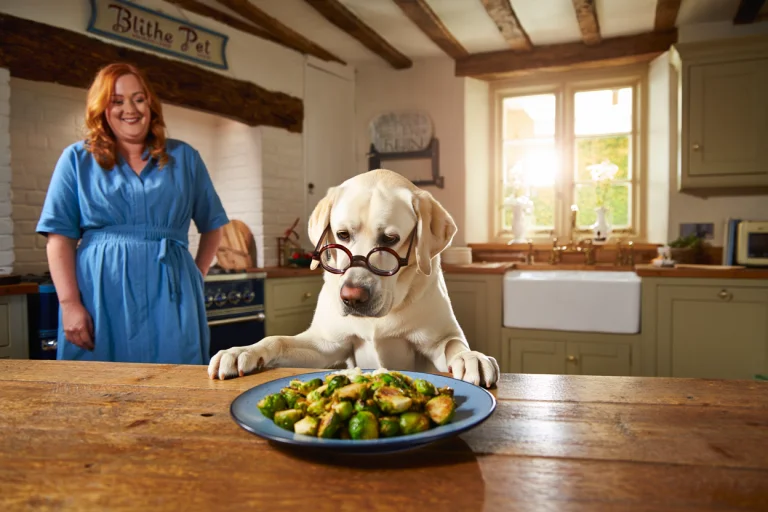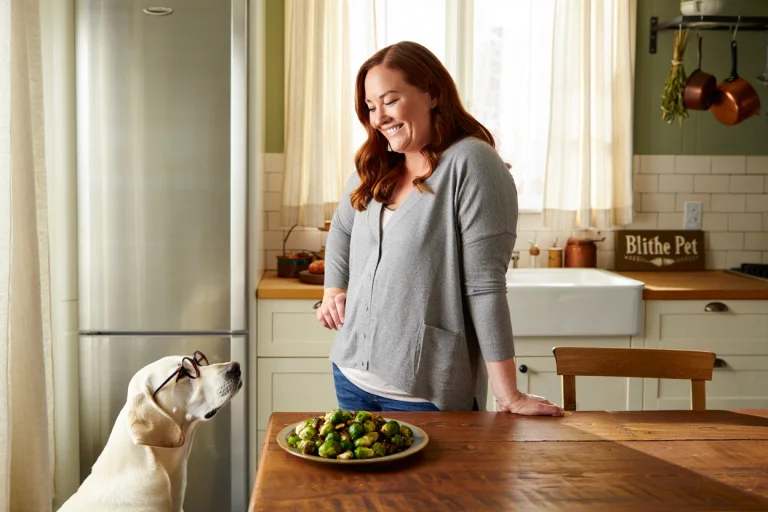Can dogs eat Brussel sprouts? Discover 5 evidence-based health benefits and learn safe preparation methods for this nutritious vegetable in your dog’s diet.
Table of Contents

As a responsible dog owner, you’re likely curious about which human foods are safe to share with your furry companion. Brussels sprouts, those miniature cabbage-like vegetables, often spark debate among pet parents. Can dogs eat Brussels sprouts safely? The good news is that yes, dogs can indeed eat Brussels sprouts in moderation, and these nutritious veggies can actually provide several health benefits for your canine friend.
Brussels sprouts are packed with vitamins, minerals, and antioxidants that can support your dog’s health in various ways. However, like any human food given to pets, there are important considerations regarding preparation, serving size, and potential side effects. This comprehensive guide explores everything you need to know about feeding Brussels sprouts to your dog, from nutritional benefits to preparation tips and serving recommendations.
The Nutritional Profile of Brussels Sprouts
What Makes Brussels Sprouts Nutritious?
Brussels sprouts are nutritional powerhouses, containing an impressive array of vitamins, minerals, and other beneficial compounds. Understanding their nutritional profile helps explain why they can be a healthy addition to your dog’s diet when served appropriately.
Brussels sprouts contain:
- Vitamin K: Essential for proper blood clotting and bone health
- Vitamin C: Supports immune function and acts as an antioxidant
- Vitamin A: Promotes healthy vision, immune function, and cell growth
- B vitamins: Aid in energy metabolism and nervous system function
- Fiber: Supports digestive health and regular bowel movements
- Antioxidants: Help combat free radicals and reduce inflammation
- Manganese: Supports bone development and enzyme functions
- Potassium: Maintains proper fluid balance and muscle function
- Folate: Important for cell division and DNA synthesis
This nutritional density makes Brussels sprouts a potentially beneficial supplement to your dog’s regular diet, providing nutrients that may complement their commercial dog food.
Comparing Brussels Sprouts to Other Safe Vegetables for Dogs
While Brussels sprouts offer numerous health benefits, it’s helpful to understand how they compare to other dog-safe vegetables:
| Vegetable | Key Benefits | Potential Concerns | Preparation Tips |
| Brussels Sprouts | High in vitamins K, C, fiber, antioxidants | Gas production, choking hazard if whole | Cook thoroughly, cut into small pieces |
| Carrots | Vitamin A, dental health, low calorie | Few concerns, generally very safe | Can be served raw or cooked, cut into appropriate sizes |
| Green Beans | Fiber, vitamins, low calorie | Few concerns | Serve plain without seasonings, cooked or raw |
| Pumpkin | Fiber, helps with digestion | None when plain | Pureed, no spices or sugar |
| Sweet Potatoes | Vitamins A, C, fiber | High in starch/sugar | Cook thoroughly, no seasonings |

5 Health Benefits of Brussels Sprouts for Dogs
Brussels sprouts can offer several important health benefits for your canine companion when incorporated properly into their diet. Let’s explore the five primary benefits these vegetables can provide.
1. Improved Digestive Health
One of the most significant benefits Brussels sprouts offer is their high fiber content. Dietary fiber plays a crucial role in canine digestive health by:
- Promoting regular bowel movements: The fiber in Brussels sprouts adds bulk to stool, helping to prevent constipation.
- Supporting healthy gut bacteria: Soluble fiber acts as a prebiotic, feeding beneficial bacteria in your dog’s gut.
- Aiding in weight management: High-fiber foods help your dog feel fuller longer, which can assist with weight control.
A study published in the Journal of Animal Science found that dietary fiber supplementation in dogs improved stool quality and increased beneficial gut bacteria populations. While this study wasn’t specific to Brussels sprouts, it demonstrates the importance of fiber sources like these vegetables in canine diets.
2. Anti-inflammatory and Antioxidant Properties
Brussels sprouts contain powerful antioxidant compounds that can help reduce inflammation and oxidative stress in your dog’s body:
- Kaempferol: A flavonoid with potent anti-inflammatory effects
- Sulforaphane: A sulfur-rich compound that activates the body’s natural antioxidant systems
- Vitamin C: A well-known antioxidant that supports immune function
These compounds help neutralize harmful free radicals in your dog’s body, potentially reducing the risk of chronic diseases and supporting overall cellular health. The anti-inflammatory properties may be particularly beneficial for older dogs or those with inflammatory conditions like arthritis.
3. Cancer-Fighting Potential
The cruciferous vegetable family, which includes Brussels sprouts, is known for containing compounds that may help prevent cancer development:
- Isothiocyanates: These sulfur-containing compounds have been shown to inhibit cancer cell growth in laboratory studies.
- Indole-3-carbinol: A compound that may help regulate cell division and growth.
Research from the American Institute for Cancer Research indicates that compounds in cruciferous vegetables like Brussels sprouts may help prevent cancer by:
- Protecting cells from DNA damage
- Inactivating carcinogens
- Inhibiting tumor blood vessel formation
- Promoting the self-destruction of abnormal cells
While most research has focused on humans and laboratory animals rather than dogs specifically, the biological mechanisms suggest potential cancer-protective benefits for our canine companions as well.
4. Immune System Support
Brussels sprouts provide essential nutrients that help maintain a strong immune system:
- Vitamin C: Supports various cellular functions of the immune system
- Vitamin A: Helps maintain the integrity of mucosal surfaces, which are the body’s first line of defense
- Folate: Important for healthy cell division, including immune cells
- Antioxidants: Help protect immune cells from damage
A robust immune system helps your dog fight off infections and recover more quickly from illness. The nutrient profile of Brussels sprouts makes them an excellent immune-supporting addition to your dog’s diet.
5. Bone Health Maintenance
Brussels sprouts are particularly rich in vitamin K, which plays a crucial role in bone health:
- Vitamin K1: Helps activate proteins involved in bone mineralization
- Calcium and phosphorus: Though present in smaller amounts, these minerals are essential building blocks for strong bones
- Manganese: Supports the formation of bone collagen and bone mineralization
For aging dogs or breeds predisposed to bone and joint issues, the bone-supporting nutrients in Brussels sprouts may provide valuable dietary support.

How to Prepare Brussels Sprouts for Dogs
Proper preparation of Brussels sprouts is essential to maximize benefits and minimize potential digestive upset for your dog.
Safe Preparation Methods
Follow these guidelines when preparing Brussels sprouts for your canine companion:
- Wash thoroughly: Rinse Brussels sprouts under cold water to remove any pesticide residues or dirt.
- Remove stems and outer leaves: Cut off the hard stem end and remove any damaged or discolored outer leaves.
- Cook properly: Raw Brussels sprouts are difficult for dogs to digest and may cause more gas and digestive upset. Choose one of these cooking methods:
- Steaming: Preserves the most nutrients while softening the vegetable
- Boiling: Makes Brussels sprouts very soft and digestible
- Microwaving: A quick option that maintains reasonable nutrient levels
- Avoid additives: Never add:
- Salt
- Butter or oils
- Garlic or onions (toxic to dogs)
- Spices or seasonings
- Cool thoroughly: Always let cooked Brussels sprouts cool completely before serving to your dog.
- Cut into appropriate sizes: For small dogs, quarter the sprouts; for medium to large dogs, halve them to prevent choking hazards.
Serving Suggestions and Portion Sizes
The appropriate serving size depends on your dog’s size, weight, and individual digestive sensitivity:
- Small dogs (under 20 lbs): ½ to 1 small Brussels sprout
- Medium dogs (20-50 lbs): 1-3 Brussels sprouts
- Large dogs (over 50 lbs): 3-4 Brussels sprouts
Start with smaller amounts than recommended and gradually increase if your dog tolerates them well. Brussels sprouts should be considered a treat or supplement, not a main component of your dog’s diet. Follow the 10% rule – treats and supplements like vegetables should not exceed 10% of your dog’s total daily caloric intake.
Serving ideas include:
- Mixed with regular food
- As a training treat (cut into very small pieces)
- Stuffed into puzzle toys (well-cooked and mashed)
- Frozen in ice cubes for a cooling summer treat
Potential Risks and Precautions
While Brussels sprouts are non-toxic to dogs, there are some considerations and potential side effects to be aware of:
Digestive Issues and Gas
The most common side effect of feeding Brussels sprouts to dogs is increased gas production. This occurs because:
- Brussels sprouts contain raffinose, a complex sugar that dogs cannot fully digest
- Bacteria in the intestine ferment these undigested sugars, producing gas as a byproduct
This gas production is generally harmless but can be uncomfortable for your dog and unpleasant for you. To minimize this effect:
- Start with very small portions
- Ensure Brussels sprouts are well-cooked, which breaks down some of the gas-producing compounds
- Introduce gradually to allow your dog’s digestive system to adjust
Choking Hazards and Preparation Concerns
Brussels sprouts can pose a choking risk, especially for small dogs or those who tend to gulp their food without chewing. Always:
- Cut Brussels sprouts into appropriately sized pieces
- Monitor your dog while they eat new foods
- Never serve whole Brussels sprouts, particularly to small breeds
When to Avoid Giving Brussels Sprouts to Your Dog
Some dogs should not be given Brussels sprouts or should have their intake carefully monitored:
- Dogs with hypothyroidism: Brussels sprouts contain goitrogens, which in large amounts could potentially interfere with thyroid function. Dogs with thyroid issues should eat these vegetables in strict moderation if at all.
- Dogs with sensitive digestive systems: If your dog has a history of GI upset, inflammatory bowel disease, or other digestive disorders, introduce Brussels sprouts with caution or avoid them entirely.
- Dogs on specific medical diets: If your veterinarian has prescribed a special diet for your dog, consult with them before adding any new foods.
- Dogs showing allergic reactions: Though rare, some dogs may be allergic or sensitive to Brussels sprouts. Discontinue feeding immediately if you notice any adverse reactions.
Signs Your Dog Might Be Enjoying Too Many Brussels Sprouts
While Brussels sprouts can be beneficial, excessive consumption may lead to problems. Watch for these signs that indicate you should reduce the amount you’re feeding:
- Excessive gas or flatulence: The most common sign of overfeeding Brussels sprouts is increased gas production.
- Diarrhea or loose stools: Too much fiber from Brussels sprouts can disrupt your dog’s digestive system.
- Abdominal discomfort: Look for signs like restlessness, pacing, or a hunched posture.
- Vomiting: This may indicate that your dog cannot tolerate Brussels sprouts or has consumed too many.
- Decreased appetite for regular food: Brussels sprouts should supplement, not replace, your dog’s normal diet.
If you notice any of these signs, reduce or eliminate Brussels sprouts from your dog’s diet. If symptoms persist for more than a day, consult your veterinarian.
Integrating Brussels Sprouts into Your Dog’s Diet
Creative and Healthy Ways to Serve Brussels Sprouts
To make Brussels sprouts appealing to your dog, consider these serving suggestions:
- Mixed with regular food: Chop cooked, cooled Brussels sprouts finely and mix with your dog’s regular food.
- Combined with other dog-safe vegetables: Create a vegetable medley with other safe options like carrots or green beans.
- Homemade dog treats: Purée well-cooked Brussels sprouts and mix with a little pumpkin purée or plain yogurt, then freeze in ice cube trays for a refreshing treat.
- Training rewards: Very finely chopped, well-cooked Brussels sprouts can serve as low-calorie training treats for dogs who enjoy the taste.
Balancing Brussels Sprouts with Other Nutritional Needs
Remember these key points when incorporating Brussels sprouts into your dog’s diet:
- Treats, including vegetables, should account for no more than 10% of your dog’s daily caloric intake
- Commercial dog food should remain the foundation of your dog’s diet
- Rotate between different safe vegetables to provide varied nutrients
- Monitor your dog’s weight and adjust portions of treats and supplements accordingly
- Always ensure fresh water is available
Expert Veterinary Perspectives
Veterinary nutritionists generally agree that Brussels sprouts can be a healthy addition to most dogs’ diets when properly prepared and served in moderation.
Dr. Jennifer Coates, DVM, notes: “Cruciferous vegetables like Brussels sprouts contain valuable nutrients and antioxidants that can benefit dogs, but they should be thoroughly cooked and introduced gradually to minimize digestive upset.”
The American Kennel Club also acknowledges Brussels sprouts as safe for dogs when properly prepared, highlighting their nutritional benefits while cautioning about potential gas production.
Most veterinary experts recommend:
- Consulting with your veterinarian before making significant changes to your dog’s diet
- Starting with small amounts of any new food
- Monitoring for any adverse reactions
- Ensuring proper cooking and preparation
Alternatives to Brussels Sprouts for Dogs
If your dog doesn’t tolerate Brussels sprouts well or you’re looking for variety, consider these dog-safe vegetables with similar nutritional benefits:
Other Dog-Safe Vegetables with Similar Benefits
- Broccoli: Another cruciferous vegetable rich in vitamins K, C, and antioxidants
- Cabbage: Contains many of the same beneficial compounds as Brussels sprouts but may be gentler on digestion for some dogs
- Kale: High in vitamins A, K, and antioxidants
- Green beans: Lower in gas-producing compounds while still providing fiber and nutrients
- Carrots: Rich in beta-carotene and great for dental health
Comparing Different Vegetable Options for Different Dog Needs
| Vegetable | Best For | Special Considerations |
| Brussels Sprouts | Dogs needing vitamin K, immune support | May cause gas; cook thoroughly |
| Carrots | Dental health, weight management | Low calorie, good for treats |
| Green Beans | Weight management, digestive health | Generally well-tolerated, minimal gas |
| Pumpkin | Constipation, diarrhea | Use plain purée (not pie filling) |
| Sweet Potatoes | Energy, vitamin A | Higher in calories and sugar |
| Cucumber | Hydration, low-calorie treat | Minimal nutritional value but very low calorie |
FAQ: Common Questions About Dogs and Brussels Sprouts
Can puppies eat Brussels sprouts?
Answer: Yes, puppies can eat Brussels sprouts, but with extra caution. Their developing digestive systems are more sensitive than adult dogs. Very small amounts of well-cooked, thoroughly cooled, and finely chopped Brussels sprouts can be introduced to puppies over 3 months of age. Start with tiny portions and monitor closely for any digestive upset. Puppies have different nutritional needs than adult dogs, so it’s especially important that treats like Brussels sprouts make up only a very small portion of their diet.
How often can I feed my dog Brussels sprouts?
Answer: For most healthy adult dogs, Brussels sprouts can be offered 1-2 times per week in appropriate portions. Some dogs with particularly robust digestive systems may tolerate them more frequently, while others might show signs of digestive upset with even occasional servings. Pay attention to your individual dog’s response and adjust accordingly. If you notice increased gas or looser stools, reduce the frequency.
Can Brussels sprouts help with my dog’s constipation?
Answer: Yes, the fiber in Brussels sprouts can help alleviate mild constipation in dogs. The fiber adds bulk to stool and can help stimulate normal bowel movements. However, for chronic or severe constipation, consult your veterinarian instead of relying on dietary adjustments alone. There may be other causes that need medical attention. If using Brussels sprouts for occasional constipation, ensure they’re well-cooked and start with small amounts.
Are Brussels sprout stems and leaves safe for dogs?
Answer: The leaves of Brussels sprouts are safe for dogs when cooked properly. The stems, however, are tougher and more fibrous, making them harder to digest and potentially posing a choking hazard. It’s best to remove the hard stem end before cooking Brussels sprouts for your dog. If you include any portion of the stem, ensure it’s very well-cooked and soft enough to be easily mashed with a fork.
Can dogs eat raw Brussels sprouts?
Answer: While technically not toxic when raw, Brussels sprouts should not be fed raw to dogs. Raw Brussels sprouts are much harder for dogs to digest, significantly increasing the likelihood of gas, bloating, and digestive discomfort. The cooking process breaks down the tough plant fibers and some of the complex sugars that cause gas, making cooked Brussels sprouts much gentler on your dog’s digestive system. Always steam, boil, or microwave Brussels sprouts until fully tender before feeding them to your dog.
Will Brussels sprouts make my dog’s breath smell bad?
Answer: Brussels sprouts contain sulfur compounds that can temporarily affect breath odor in both humans and dogs. This effect is usually mild and temporary. If you notice your dog’s breath smells significantly worse after eating Brussels sprouts, you might be feeding too large a portion. Proper dental hygiene, including regular brushing and dental chews, can help mitigate any temporary breath odors from foods like Brussels sprouts.
Can Brussels sprouts cause diarrhea in dogs?
Answer: Yes, Brussels sprouts can cause diarrhea in dogs if fed in excessive amounts or if the dog has a particularly sensitive digestive system. The high fiber content and certain complex sugars in Brussels sprouts can lead to loose stools, especially when first introduced to the diet. To prevent this, start with very small amounts and gradually increase the portion if your dog tolerates them well. If diarrhea occurs, discontinue Brussels sprouts and consult your veterinarian if the symptoms persist for more than 24 hours.
Are frozen Brussels sprouts safe for dogs?
Answer: Commercially frozen Brussels sprouts are safe for dogs after being properly cooked. In fact, frozen vegetables often retain more nutrients than fresh ones that have been stored for extended periods. Never feed frozen Brussels sprouts directly to your dog without cooking them first, as they are too hard and difficult to digest when frozen. Follow the same preparation guidelines as for fresh Brussels sprouts: thoroughly cook, cool completely, and cut into appropriate sizes before serving.
Enhanced Care for Your Canine Companion
Adding healthy vegetables like Brussels sprouts to your dog’s diet is just one aspect of comprehensive pet care. Proper nutrition works best when combined with:
- Regular veterinary check-ups: Annual or bi-annual wellness exams help catch potential health issues early
- Appropriate exercise: Regular physical activity tailored to your dog’s age, breed, and health status
- Mental stimulation: Training, puzzle toys, and enrichment activities
- Dental care: Regular brushing and professional cleanings when recommended
- Weight management: Maintaining healthy weight through proper diet and exercise
For more expert advice on pet nutrition and care, explore the comprehensive guides and tips available on BlithePet. Our team of pet care specialists and veterinary consultants provides up-to-date information on all aspects of dog health and wellness, including detailed nutritional guides for different life stages and health conditions.
Conclusion: Brussels Sprouts as Part of a Balanced Canine Diet
Brussels sprouts can indeed be a healthy, nutritious addition to your dog’s diet when prepared and served properly. These nutrient-dense vegetables offer various health benefits, from digestive support to immune function enhancement and potential cancer-fighting properties. The rich array of vitamins, minerals, and antioxidants in Brussels sprouts makes them a valuable occasional supplement to your dog’s regular food.
However, moderation is key. Brussels sprouts should be viewed as a supplement or treat, not a dietary staple for dogs. The potential for increased gas production and other digestive effects means they should be introduced gradually and in appropriate portions based on your dog’s size and individual tolerance.
By following the preparation guidelines outlined in this article—thoroughly cooking the sprouts, avoiding seasonings or additives, and cutting them into appropriate sizes—you can minimize potential downsides while maximizing nutritional benefits. Always monitor your dog for any adverse reactions when introducing new foods, including Brussels sprouts.
Remember that every dog is unique. What works well for one may not be suitable for another, so pay attention to your individual pet’s response and adjust accordingly. When in doubt, consult with your veterinarian, particularly if your dog has existing health conditions or dietary restrictions.
Have you tried feeding Brussels sprouts to your dog? We’d love to hear about your experience! Share your stories, tips, or questions in the comments below, and let us know how your furry friend responded to this nutritious vegetable.







